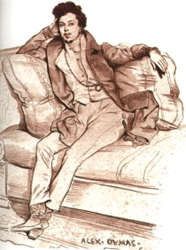Alexandre Dumas (July 24, 1802 - December 5, 1870)
 Hear a "Canna Bite" on Alexandre Dumas (produced by KMUD radio).
Hear a "Canna Bite" on Alexandre Dumas (produced by KMUD radio).
Alexandre Dumas ranks among the most widely read novelists of Romantic literature and may be the most beloved writer France has ever produced (Pocket Books). Dumas became known as the King of Paris and a saying held that, "when Dumas snores, Paris turns in its sleep."
Dumas's father was born a slave on Santa Domingo (now Haiti), the son of a black slave and her owner, a Marquis. By the age of 31 he was serving as a general in the French army during the Egyptian campaign, where Napoleon's troops learned to take hashish (much to Napoleon's consternation). General Dumas had a falling out with Napoleon during campaign and was denied his pension, leaving his family penniless when he died at the age of 43.
Alexandre Dumas began his working life in Paris as a clerk to the future King Louis-Philippe. He spent his early twenties reading and attending the theatre, and in 1829, the same year Victor Hugo published Les Orientales, Dumas had instant success with his play "Henri III et sa cour" at the Comedie Française. After several other popular plays, Dumas traveled extensively and began writing books and articles. Often working with collaborators, his complete works fill 300 volumes.
Press censorship was lifted in 1830s France, and this coupled with increasing literacy lead to a market for serially published novels. Dumas's The Three Musketeers and The Count of Monte Cristo both appeared to wild success in serial form in 1844, the same year "Le Club des Haschishins" was founded. Club members Dumas, Hugo, Eugene Delacroix, Charles Baudelaire, Gérard de Nerval and others met regularly to consume hashish at a hotel in Paris.
Modern editions delete much from the 117-chapter The Count of Monte Cristo, and often obscure references to hashish. But in the unabridged version, the Count, calling himself Sinbad the Sailor, offers hashish to a guest, calling it "nothing less than the ambrosia which Hebe served at the table of Jupiter." When his guest expresses disinterest, he says,
Are you a man for the substantials, and is gold your god? taste this, and the mines of Peru, Guzerat, and Golconda are opened to you. Are you a man of imagination -- a poet? taste this, and the boundaries of possibility disappear; the fields of infinite space open to you, you advance free in heart, free in mind, into the boundless realms of unfettered revery. Are you ambitious, and do you seek after the greatnesses of the earth? taste this, and in an hour you will be a king, not a king of a petty kingdom hidden in some corner of Europe like France, Spain, or England, but king of the world, king of the universe, king of creation; without bowing at the feet of Satan, you will be king and master of all the kingdoms of the earth. . . ."
Judge for yourself...judge, but do not confine yourself to one trial. Like everything else, we must habituate the senses to a fresh impression, gentle or violent, sad or joyous. There is a struggle in nature against this divine substance, -- in nature which is not made for joy and clings to pain. Nature subdued must yield in the combat, the dream must succeed to reality, and then the dream reigns supreme, then the dream becomes life, and life becomes the dream. . . Taste the hashish, guest of mine -- taste the hashish. (See full excerpts)
Like Hugo, Dumas left France in 1851, but in Dumas's case it was to escape debts brought on by his extravagant lifestyle. He soon returned to France where he edited L'Indipendente, a literary and political journal published in French and Italian. He died in 1870.
In November 2002, by order of the French President Jacques Chirac, Alexandre Dumas's body was exhumed from the cemetery at his birthplace, Villers-Cotterets. Flanked by four Republican Guards costumed as the Musketeers - Athos, Porthos, Aramis and D'Artagnan - Dumas was transported in a solemn procession to the Pantheon of Paris, the great mausoleum where French luminaries are interred. In his speech, President Chirac said: "With you, we were D'Artagnan, Monte Cristo or Balsamo, riding along the roads of France, touring battlefields, visiting palaces and castles--with you, we dream." In an interview following the ceremony, President Chirac acknowledged that racism that had existed, saying that a wrong had now been righted with Dumas enshrined alongside fellow authors Victor Hugo and Voltaire.
Alexandre Dumas's home outside of Paris, the Chateau Monte Cristo, has been restored and is open to the public. His stories have been translated into almost a hundred languages, and have inspired more than 200 motion pictures.